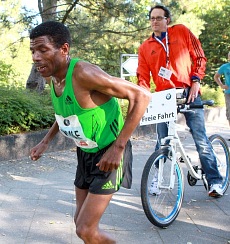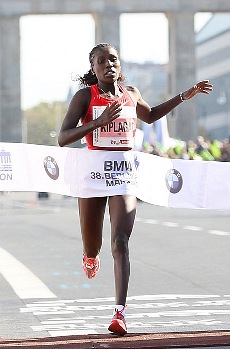|
2011 Berlin Marathon - Sunday, September 25, 2011
By John Elliott and Sharon Ekstrom
The Berlin Marathon likes to claim that it is the fastest non-aided course on the planet - and time after time it proves that to be true.
The World Record/Progression
Men's Marathon WR Progression:
2:03:38 Patrick Makau (Berlin - 9/25/11)
2:03:59 Haile Gebrselassie (Berlin - 9/28/08)
2:04:26 Haile Gebrselassie (Berlin - 9/30/07)
2:04:55 Paul Tergat (Berlin - 9/28/03)
2:05:38 Khalid Khannouchi (London - 4/14/02)
2:05:42 Khalid Khannouchi (Chicago - 10/24/99)
2:06:05 Ronaldo de Costa (Berlin - 9/20/98)
2:06:50 Belayneh Dinsamo (Rotterdam - 4/17/88)
2:07:12 Carlos Lopes (Rotterdam - 4/20/85)
2:08:05 Steve Jones (Chicago - 10/21/84)
|
|
Sometimes in an article, we'll build suspense before announcing the winner, but by now it should be no secret that Patrick Makau has won the Berlin Marathon in world record fashion: 2:03:38. With this record, Berlin is responsible for five of the nine world marathon records set since 2000. The course has seen more world records than any other - five on the men's side and two on the women's side. And Berlin has also been responsible for making "impossible" time standards possible: the first sub-2:20 women's marathon took place in Berlin and the first sub-2:05 and sub-2:04 marathons took place in Berlin.
The Men's Race

Photo Credit: PhotoRun
|
The fields at Berlin haven't been as deep as at some other races, but with each year comes the question of whether the race will produce see another world record. Such was the case for the 2011 Berlin Marathon as the pacemakers were set to bring the men through 30K enroute to a world record and the pacers did exactly what they were hired to do. At 10K, six pacers were leading five runners - but in the lead group we knew the story would ony be about two men, Patrick Makau and Haile Gebrselassie. For the defending champion, Patrick Makau, the question was whether he could break the world record. Haile Gebreselassie, the two-time and reigning world record holder and four-time Berlin Champion, had dropped out of his last marathons and not finished a marathon since 2009. If Gebrselassie was back to peak shape, he could compete against anyone, but many thought that Geb's best days were behind him and this Berlin Marathon would seal the debate.
By 15K, the pacers were leading just two men, Makau and Gebrselassie, and they were running on a perfect pace. The pacers and the duo of Makau and Gebrselassie passed the halfway mark in 61:43. If they could keep that pace, the resulting 2:03:26 would better the previous record of 2:03:59 by 33 seconds - they had room to spare, but were not on a pace that would put them in danger.

Photo Credit: PhotoRun
|
A Half Marathon of 61:43 is still easy for Gebrselassie, but at 38+ years of age and in what is becoming the twilight of his career, a sub-2:04 marathon should be impossible and we doubted that he could keep this up. Just before 17 miles, Gebrselassie, slowed and ran off the course - out of the race. One of the pacers dropped back to run with Geb and Mark Milde, the race director who was following the lead pack on a bike, seemed to encourage Gebrselassie back into the race and Geb did return to the course, running a slightly easier tempo. It would have been nice to see Gebrselassie finish just a few minutes back from the leader in a respectable time - and that seemed to have been possible, but it was not to be on this day as Geb dropped out completely just after 21 miles.
Makau continued on with his pacer through 19 miles and then alone to the finish line. Throughout, the Kenyan looked comfortable and hardly slowed, running the second half just twelve seconds slower than the first and easily smashing the existing world record with a finish time of 2:03:38. After the race, Makau would say that everything went just as it should - and indeed it did.
With the incredible pace set in the earlier miles, all but one who went out with the front pacers and Makau eventually dropped out. At some races, the pacemakers are not treated as part of the race and by contract are required to drop out at 30K. At Berlin, there has been a long tradition of allowing the pacemakers to finish if they feel fit. While Makau's pacemakers were spent and would not have been able to finish, Stephen Kwelio Chemlany, a pacer who was paid to bring the second group through 30K at a 2:08 pace, recognized that most of the front pack had dropped out and that he was filling well. With that in mind, Chemlany continued on and finished in second place in 2:07:55. Edwin Kimaiyo, the only runner in the original front pack - besides Makau - to finish, took third place in 2:09:50. Felix Limo of Kenya, the past London and Chicago Marathon winner, finished fourth. In fifth place and getting a lot of press, Scott Overall of the UK ran an incredible 2:10:55 in his debut marathon to become the current fastest British marathoner.
-
The Women's Race
In recent years, the focus at Berlin has been on the men and a men's world record. The same would be true for 2011.
As the race began, just two women (and their pacemakers) were running in the front: Paula Radcliffe and Florence Kiplagat. The two could not be more opposite as they started the Berlin Marathon. Paula Radcliffe at 37 years old is the most accomplished female marathoner of all time who, among other achievements has run the three fastest marathons ever by a woman; was two years from her last marathon and without much racing experience since having her second child a year earlier. Radcliffe, who has been plagued by injuries, was running the race to test her fitness, but most importantly to gain a qualifying time that would allow her to go to the 2012 Olympics. For the fastest women's marathoner in the world, it was interesting to hear that winning would not be the primary goal.

Photo Credit: PhotoRun
|
Florence Kiplagat, 24 years old, had attempted only one previous marathon and dropped out at of the 2011 Boston Marathon. She was the 2010 Half Marathon World Champion, but had yet to succeed at a marathon.Mikitenko-Kiplagat-Radcliff
Behind the two leaders, another two women were running together: the 2007/2008 champion, Irina Mikitenko (39) and the 2009 champion, Atsede Habtamu (23) of Ethiopia. In recent marathons, we've noticed that Mikitenko is conservative as she starts her races and we could tell that she would be happy to finish strongly even if she was not to finish first.

Photo Credit: PhotoRun
|
By 7K, one of Radcliffe's injuries - in her leg - began to bother her and she began to fall back. By 15K, the race was taking some shape as Florence Kiplagat was looking strong in the lead, Radcliffe was holding on fairly well in second place ten seconds back and Mikitenko and Habtamu were a further minute behind.
Kiplagat would continue strong to the end of the race extending her lead with each step and won easily in 2:19:44. Mikitenko, having started conservatively, was able to pass Radcliffe at 20 miles and continued on to finish second in 2:22:18. Radcliffe held on to finish third in 2:23:46. After the race she would say that "The goal was to get through and get an Olympic qualifying time... After the training I had this summer - it was up and down - coldly [unemotionally], I should be happy with this result. But I'm still upset that I couldn't win." Habtamu, struggling and slowing, finished in fourth place in 2:24:25.
Final Results:

Photo Credit: PhotoRun
|
Men:
1. Patrick Makau (KEN) 2:03:38 - 40,000 EUROS
2. Stephen Kwello Chemlany (KEN) 2:07:55 - 20,000
3. Edwin Kimaiyo (KEN) 2:09:50 - 17,500
4. Felix Limo (KEN) 2:10:38 - 15,000
5. Scott Overall (GBR) 2:10:55 - 10,000
6. Ricardo Serrano (ESP) 2:13:32 - 7,500
7. Pedro Nimo (ESP) 2:13:34 - 5,000
8. Simon Munyutu (FRA) 2:14:20 - 4,000
9. Driss El Himer (FRA) 2:14:46 - 3,000
10. Hendrick Ramaala (RSA) 2:16:00 - 2,000
Women:
1. Florence Kiplagat (KEN) 2:19:44 - 40,000 EUROS
2. Irina Mikitenko (GER) 2:22:18 - 20,000
3. Paula Radcliffe (GBR) 2:23:46 - 15,000
4. Atsede Habtamu (ETH) 2:24:25 - 10,000
5. Tatyana Petrova (RUS) 2:25:01 - 7,500
6. Anna Incerti (ITA) 2:25:32 - 5,000
7. Rosaria Console (ITA) 2:26:10 - 4,000
8. Valeria Straneo (ITA) 2:26:33 - 3,000
9. Eri Okubo (JPN) 2:28:49 - 2,500
10. Miranda Boonstra (NED) 2:29:23 - 2,000
|







